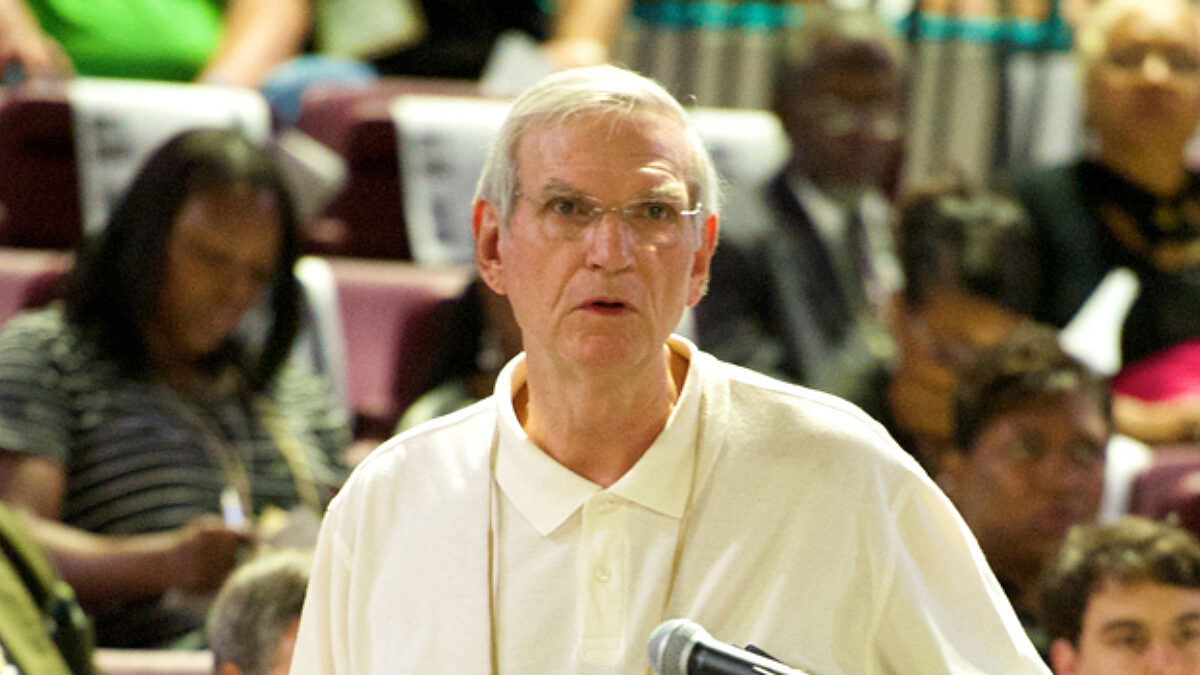
Connectional Ministries to handle race reconciliation proposal
By Jessica Connor
Connectional Ministries will take the reins of a new proposal to cultivate racial reconciliation in S.C. United Methodist churches.
The Rev. John Culp made a motion during the Connectional Ministries report Tuesday that the Emerging Ministry Fund use up to $10,000 to create a task force and host two one-day conferences in 2015 to address racial prejudice and injustice as a theological and missional imperative in local churches and communities.
Making his motion, Culp told the body he remembered when he came into the conference 45 years ago and witnessed the merger of the two conferences: one predominantly white and the other African-American. While we have made much progress since then, he said, “Racism still exists in our churches and our society.”
Rather than adopting the motion as-is, the body decided to refer the matter to Connectional Ministries for consideration and action.
The Rev. Gary Phillips, pastor of John Wesley UMC, Charleston, made the motion to refer, noting Connectional Ministries is the proper channel by which to handle a program like this for the conference.
“I think of the life of the church as a solar system with planets and moons and regular paths and patterns, but periodically there are meteorites that come shooting through and … you have to know where they'll land before they go killing off all the dinosaurs,” Phillips said.
Others agreed. Speaking for the motion, the Rev. Bob Huggins of St. John UMC, Sumter, said the conference is organized through Connectional Ministries, which is already in place to handle proposals like this.
“We’re going to get to the point where Connectional Ministries has no purpose if we continue to do these from the floor where there is no thought process,” Huggins said.
Others felt such a referral would take too long.
The Rev. Hayes Gainey, pastor of Edisto Fork UMC, Orangeburg, said Annual Conference members should not see the motion as a “meteorite to destroy dinosaurs” but a way to build up God’s plan quickly and efficiently.
“Sometime when things are referred it takes a long time to hit the floor or the grassroots to take place so that a change can come,” Gainey said. “I’m in a mindset that when we address issues and the family comes together as this body, we can change the world. We can make this church our one true church regardless of our race.”
The Rev. Larry McCutcheon, pastor of Trinity UMC, Orangeburg, agreed referring it would only slow down what needs to happen fast.
“As we look at the (racial) environment in our society, and in our state in particular, we need to take some immediate action,” McCutcheon said.
But Connectional Ministries Convener Cynthia Williams told the body she is confident Connectional Ministries has created an environment where they are able to act capably on things that come before them.
“We are acting on requests. We are moving,” Williams said, urging people to “get on the team, join the game,” and bring proposals and ideas through the District Connectional Ministries.
The original motion calls for two conferences to be held—one at Wofford College and one at Claflin University—and for all clergy and at least one layperson from the local church to attend the conferences. Each pastor would also report at charge conference what is being done in the local church and community toward racial reconciliation and justice, or set specific goals.
Culp noted in his motion that S.C. has the largest number and percentage of African-American United Methodists and clergy.
“Racism remains a systemic problem in the church and society, though the manifestations tend to be more subtle,” Culp said, noting that local churches very often remain segregated with little interaction across racial and ethnic boundaries.
Watch the Advocate for further details as Connectional Ministries considers this.